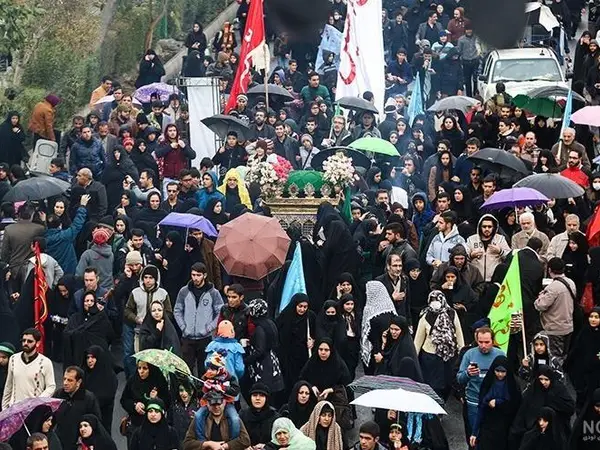The Iranian government is promising perks including loans and free Internet to those participating in the Arbaeen pilgrimage to Karbala, Iraq, later this month.
Government spokesman Ali Bahadori-Jahromi said Tuesday that in the latest cabinet meeting President Ebrahim Raisi ordered all government organizations to provide maximum facilitation for the annual pilgrimage to Karbala where the main events of the annual ceremonies take place.
According to Bahadori-Jahromi, the government has improved the country’s infrastructures to facilitate pilgrimage to the religious city of Karbala including ten different airports for flights to Iraq as well as six dedicated border checkpoints, and the railway network. The first rail line from Tehran to Karbala has now been launched, he added.
The Civil Aviation Organisation has said but it has prepared 1,000 special flights to Iraq For the ceremonies.
Iran will probably end up spending hundreds of millions of dollars to sponsor a large pilgrimage because both domestically and in the region the clerical regime needs to show its ideology is influential.
In 2019, The New York Times quoted an influencial Iranian media boss, Hossein Sulaimani, as saying, “Arbaeen is a display of power for Iran and a showcase of unity among Shiites in the region."
The government will also be stationing a hot air balloon in the Iraqi border area to provide free mobile Internet access as well as free Wi-Fi to pilgrims and will also grant 50 million rial loans (around $160) to heads of households going on family pilgrimage and 30 million ($100) to individual pilgrims, he said, adding that the loan can be secured by online application and there will be no need for guarantees if the applicant has a cash subsidy account.
Around 5 million Iranian pilgrims are expected to travel to Iraq during the Arbaeen ceremonies which fall on September 18 this year. If such a large number end up going, the loan alone can cost the government upwards of $500 million amid an estimated 50-percent budget deficit.
Iranian authorities deploy all religious entities and media to encourage pilgrimage to Karbala. Government organisations and the state affiliated charities as well as municipalities and city councils often allocate considerable budgets to organize the Arbaeen Walk. Some officials and clerics say the Arbaeen gathering is one of the manifestations of the Shia “soft power’.
Many government organizations, municipalities, and city councils have separately allocated special budgets for the Arbaeen ceremonies in Iraq. The City Council of Mashhad, for instance, has approved a budget of 150 billion rials ($5 million) for services in the Iraqi holy city of Najaf and will dispatch 525 city cleaners and 354 bus drivers there.
“Arbaeen was a grassroots religious occasion…but the Islamic Republic turned it into a state ceremony. holding state religious events and using public money for that purpose. It means the government is putting its hand in people’s pockets without asking for permission,” Reza Veisi, Iran International analyst tweeted Monday.
The Arbaeen ceremony which marks the end of the 40-day mourning period following Ashura -- the religious ritual for the commemoration of the third Shia Muslim Imam, Hussain ibn Ali, the grandson of the Prophet Muhammad, killed in 680 AD – is the world's largest annual gathering.
Millions of Shia Muslims gather every year to mark Arbaeen in Karbala, Iraq, where the Imam is buried. Many walk long distances, even hundreds of kilometres, to the shrine of the Imam.
There are no reliable methods for tallying the number of visitors to Iraqi holy Shia sites during Arbaeen. In 2019, before the pandemic, an estimated 15 million people from various countries attended the ceremonies.
